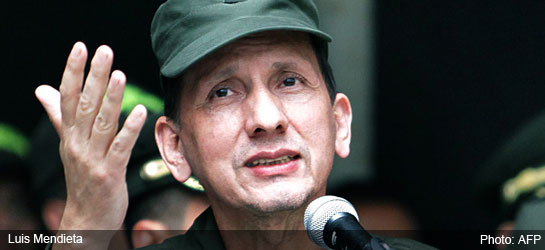
After he was captured by leftist rebels, Luis Mendieta’s status in Colombia’s police force suddenly became his curse. The rebels’ military chief told the lieutenant colonel — his highest-ranking hostage — that he would be the last captive freed.
But over 12 years, Mendieta never lost hope, he told The Associated Press in an interview this week — not through forced jungle marches and bouts of malaria, not while tethered by chains to other captives, not even when he was so weak he had to crawl to the latrine.
During that time, he had a unique perspective as Colombia’s once bedraggled military transformed itself into a formidable, professional force, and morale sank among his mostly youthful guerrilla guards of the Revolutionary Armed Forces of Colombia, or FARC.
Until finally, rescue actually seemed possible.
“We would look into the jungle, expecting at any moment for someone to emerge,” Mendieta laughed.
Last month, someone did. On Mendieta’s 53rd birthday, the camouflaged face he’d long been seeking in the undergrowth finally appeared. Gunfire crackled, his rebel guards fled and he slithered through the mud to safety. His saviors were elite Colombian commandos whose U.S.-trained unit didn’t exist until well into his captivity.
Mendieta was relaxed Tuesday evening as he sat on the velvet couch of his modest Bogota apartment. After years in worn-out sweat pants and T-shirts, he wore a new pinstriped suit and black leather shoes. Police stood guard outside.
Promoted to general in captivity, Mendieta is now Colombia’s most senior police officer, with 36 years of service.
He is balding but not gray and nurses a chest cold. A decade of privation took its toll: Mendieta shows reporters his pencil-thin calves held by compression socks. Physiotherapy addresses lost muscle mass, poor circulation in his legs, aching knee joints and a bad back.
“But I sleep well,” he said. “I feel like I’ve been reborn.”
He’s not sure what he’ll do next, but wants to study, including English and Russian. A fellow captive taught him the foreign tongues in the jungle.
Mendieta commanded the 77-man police garrison in the Amazon jungle town of Mitu when it was overrun in 1998 by 2,000 rebels armed with guns, grenade launchers and plastic explosives.
In the early days, hostage life was easier. The FARC was at the height of its military power. It had a Switzerland-sized safe haven in its traditional southern stronghold, where it took delivery of 10,000 new AK-47 assault rifles as it expanded its cocaine-trafficking operations.
Mendieta was taken to that safe haven, where he met Jorge Briceño, the rebels’ military chief, and other FARC commanders.
He was fed steak and slept on mattresses. Instead of chains, captives were tied together by ropes.
In 2002, however, after peace talks failed, the government dissolved the safe haven and began to squeeze the rebels, stepping up military operations and creating new mobile brigades made up exclusively of volunteers.
Mendieta’s provisions deteriorated. Occasional beef and chicken were replaced by jungle rodents and reptiles.
In late 2002, Mendieta and other hostages were taken on a three-month trip they call “the March of Death.” Virtually every night was spent in a different place. Rebels threw away his diary, and he never started a new one.
His legs became so weak that he needed two staffs to walk. Then he couldn’t even do that — and guerrillas carried him in a hammock for 12 hours a day.
“If I had to take care of my physical needs I would have to crawl to where I would do it,” he said.
For nearly a year after that, Mendieta was among 38 FARC prisoners held in a single camp. But it, too, was dismantled due to fears that Colombia’s military, its intelligence capability improving as its airfleet burgeoned, would locate it.
Fellow hostages included Franco-Colombian politician Ingrid Betancourt and the three U.S. military contractors who would all be rescued in July 2008 in a stunning and bloodless ruse by commandos posing as international relief workers.
Mendieta was split from the others in late 2004 and moved to a series of smaller camps. Whenever his rebel guards would hear a helicopter nearby, they would nervously chamber bullets. Their orders: kill the hostages to prevent their rescue.
Foreign initiatives lifted Mendieta’s spirits, including one by President Hugo Chavez of Venezuela that saw the FARC unilaterally begin freeing “political” hostages in early 2007.
Mendieta got increasingly hopeful in 2008, as the rebels endured a series of major setbacks. One rebel leader was killed in a bombing raid by Colombia’s military, which was getting half a billion dollars a year in U.S. aid. Another was slain by a reward-seeking bodyguard. And the rebels’ legendary founder, Manuel Marulanda, died of natural causes.
Rebel desertions were at record levels, and two of Mendieta’s guards had taken their own lives. One, a medic in his late 20s named Jean Carlos, blew himself up.
By early this year, the number of guerrillas guarding Mendieta and three other hostages was down to 34.
In February or March, he witnessed a big argument among the rebels, many of whom he said were bored, tired and scared.
By the time he and his comrades were rescued on June 13, only eight rebels were on guard, with a few dozen more camped nearby.
Military officials disclosed after Mendieta’s rescue that the rebel unit holding him had been infiltrated, and at least one rebel was paid a reward.
Today, Mendieta smiles a lot, as does his wife Maria Teresa, who offers coffee before disappearing. She has sat beside him through numerous Colombian media interviews, squeezing his hand. He credits her, and weekly radio programs in which she and their children kept him up to date on their lives, for helping him endure.
“You always think of your wife, your kids, the family, of that desire to hug them, to squeeze them, to kiss them,” he said. “To return to the family, that’s what keeps you alive.” (Frank Bajak / Associated Press)

